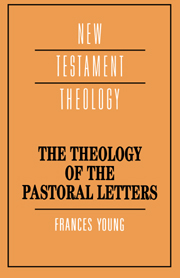Book contents
- Frontmatter
- Contents
- Editor's preface
- List of abbreviations
- 1 Theology and its context
- 2 Theology and ethics
- 3 God and the divine activity
- 4 The importance of sound teaching or What about doctrinal orthodoxy?
- 5 Duties in the household of faith or What about church order?
- 6 The contribution of the Pastorals to the reception of Paul as an Apostle
- 7 The Pastorals as scripture
- Annotated bibliography
- Index of references
- Index of subjects
5 - Duties in the household of faith or What about church order?
Published online by Cambridge University Press: 01 October 2009
- Frontmatter
- Contents
- Editor's preface
- List of abbreviations
- 1 Theology and its context
- 2 Theology and ethics
- 3 God and the divine activity
- 4 The importance of sound teaching or What about doctrinal orthodoxy?
- 5 Duties in the household of faith or What about church order?
- 6 The contribution of the Pastorals to the reception of Paul as an Apostle
- 7 The Pastorals as scripture
- Annotated bibliography
- Index of references
- Index of subjects
Summary
The need for authority and discipline explored in the previous chapter has long been recognised as a feature of the Pastoral epistles. That required authority and discipline appears to be invested in a bishop, presbyters or elders, and deacons. Not surprisingly, therefore, the Pastorals have figured in debate about the nature of the church's order and ministry since the controversies of the Reformation, and more recent historical scholarship has been anxious to place the Pastorals' evidence within theories concerning the development of the ministry or priesthood of the church. Here we have the terminology used which will become that of catholic orthodoxy. Hence the designation ‘early Catholicism’.
One problem is that because the terminology is used, it is far too easy to assume that ‘bishop’ means what a ‘bishop’ has become, that ‘presbyters’ are the ‘priests’ or ‘elders’ of later developments, and so on, projecting back anachronistic conceptions. This affects the perception not only of those who assume that these letters give scriptural authority for a particular form of ministry and therefore have a vested interest in showing that the Pastorals confirm that, but also of those engaged in historical research. A consensus has emerged that bishop and presbyters at this date overlapped, the bishop being simply the president of a college of elders; it is generally agreed that only with Ignatius is the monepiscopate clearly established, and even then it could be argued that his insistence reflects the need to recommend and defend an institution which seems not yet to have won universal authority. More recently, these letters have been used in arguments both for and against women's ministry in the church.
- Type
- Chapter
- Information
- The Theology of the Pastoral Letters , pp. 97 - 121Publisher: Cambridge University PressPrint publication year: 1994



